The government, through the Petroleum Authority of Uganda has given a green light to companies to apply the controversy Land Acquisition Act of 1965 to complete the land acquisition process in the areas of oil and gas activities.
This comes after the companies encountered a challenge of ‘absentee land users and land owners’ who could not be traced for valuation of their land and due compensation.
Two companies, TotalEnergies and Cnooc Uganda Ltd, are currently developing the oil fields towards commercial production of oil by 2025, the latest deadline set by the government and agreed with the companies.
At least 99 percent of the land acquisition process has been completed, according to the companies and the Project-Affected Persons (PAPs) compensated.
However, some cannot be traced and is expected that they migrated to other areas, most probable the ancestral homes from Bunyoro. Cnooc head of corporate affairs, Zac Lubega says they have decided to invoke the law that allows them to take over land without the consent of the owner or user, and that they will deposit the value equivalent with the courts of law.
This, he says comes after all efforts to trace them failed, and yet the projects must go on according to the timelines, even if they are only six.
The 1965 Land Acquisition Act, the latest law providing for this action, was challenged in courts of law in 2014. This followed a successful petition to the Constitutional Court by residents along the Hoima-Kaiso Tonya road, after Uganda National Roads Authority, UNRA had attempted to take over their land before compensation.
The Constitutional Court found that the Land Acquisition Act was unconstitutional and inconsistent with Article 26(2) of the Constitution, which provides for the prompt payment of fair and adequate compensation prior to the taking of possession or acquisition of any property by the State.
On appeal, the Supreme Court confirmed the sanctity of property rights under the Constitution. ”Under Article 26(2) of the Constitution, no person can be compulsorily deprived of property without prompt payment of fair and adequate compensation prior to the taking of possession or acquisition of the property,” says MAKKS Advocates.
In its appeal to the Supreme Court, UNRA sought to argue, among others, that Article 26 was not a non-derogable right and that in certain circumstances, the State would be entitled to compulsorily acquire property before payment of compensation for instance in situations of natural disasters, emergencies or in the interest of public good.
The Court held that whereas Article 26 was not among the non-derogable rights, this does not give powers to Government to compulsorily acquire people’s land without prior payment, and that such planned Government projects do not fall under the exceptions of disasters and emergences.
Gloria Sebikari, the Manager, Corporate Affairs at PAU, say they companies will not be breaking the law if they acquire the land after depositing a value with the courts of law.
“The current Land Acquisition Act provides for compulsory acquisition by depositing the amount in court. The amendment that was being proposed was to make it more direct for a project to go on,” she says.
After the Supreme Court ruling, President Yoweri Kaguta Museveni spearheaded an amendment process to the land laws to make the land acquisition for public interest, cleared stipulated in the laws. Lubega says the proposed amendment is on an existing law and that since it has not yet been completed, the current law exists.
Sebikari says the amendment will only make the process faster. “Because, before you go to court, the minister appoints the valuer for that specific contested area… so the process already exists in the current law. What the amendment was trying to bring on board, was to make it faster, without going through certain procedures.”
On the timelines, Lubega said that currently, their projects at the Kingfisher Development Area have started and are up to 10 percent in progress, adding that by 2024, they hope to be ready for crude production. “But since we are in a joint venture, production of oil and gas will commence in 2025 when all the partners are ready,” he says.
–URN





